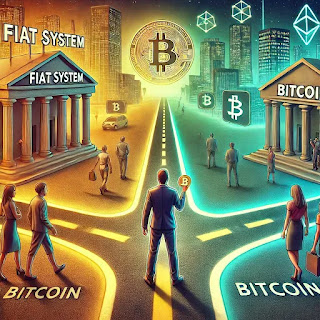Money and Identity – How Fiat Molds Consumers While Bitcoiners Become Builders
Money does not just buy things; it shapes who we are. The financial system we live under influences not only our spending habits but also how we see ourselves, what we value, and how we think about the future. Under fiat, people are conditioned to consume endlessly, constantly running on the treadmill of debt and inflation. In contrast, Bitcoin offers a radically different path, one that transforms people into savers, builders, and long-term thinkers. This is not just a financial shift; it is an identity shift.
The Consumer Identity Shaped by Fiat
Under the fiat system, debt is not seen as dangerous. It is seen as standard. Mortgages, credit cards, student loans, and car payments are all examples of how people are born into a system where borrowing is the default. Inflation ensures that today’s money is worth more than tomorrow’s, so the system pushes people to spend first and worry later.
Fiat fuels a culture of disposability. Fast fashion cycles, cheaply made gadgets, and planned obsolescence ensure that consumers keep buying more. Easy credit keeps this wheel turning, trapping people in lifestyles defined by consumption instead of creation.
A rising stock market and climbing home prices make people feel wealthier, even as their purchasing power quietly erodes. Inflation eats away at savings while encouraging speculation. Fiat wealth often turns out to be an illusion.
Fiat also incentivizes high time preference, which means prioritizing immediate gratification over long-term stability. Why save when the dollar is losing value every year? Why think about decades when the system rewards those who spend today? This mindset locks people into short-term thinking.
Bitcoin as a Shift in Identity
Bitcoin flips the script. Suddenly, holding money makes sense again. The very act of stacking sats teaches patience and discipline. Bitcoiners become savers in a world that tells everyone else to spend.
Saving naturally extends into building. Bitcoiners are more likely to channel their energy into businesses, projects, and communities that focus on long-term value instead of quick wins. This shift creates a culture of resilience and innovation.
Holding your own keys is more than financial control. It is psychological empowerment. It changes how you view independence and responsibility. No bank, government, or corporation stands between you and your money. That shift alone changes how people carry themselves.
Bitcoin rewires people’s time horizons. Instead of focusing on what they can buy today, they think in terms of years, decades, and even centuries. Identity shifts from living paycheck to paycheck to leaving a legacy.
The Clash of Identities
This is not just about money. It is about worldview. Fiat culture says happiness is found in consumption and debt-fueled lifestyles. Bitcoin culture says happiness is found in freedom, sovereignty, and building a better future. The two worldviews often clash.
Media powered by fiat pushes consumerism as identity. Status is found in spending, in brands, and in appearances. Meanwhile, Bitcoiners create counter-narratives centered on independence, authenticity, and responsibility.
The money standard you live by shapes the people you surround yourself with. Fiat creates circles obsessed with consumer trends, while Bitcoin creates circles of thinkers, savers, and visionaries. This extends to values, friendships, and even life goals.
Implications for the Future
As Bitcoin adoption grows, culture itself begins to shift. Consumerism slowly loses its grip as more people choose saving over spending, creation over consumption.
Bitcoiners are not just thinking about the next paycheck. They are thinking about their children, their grandchildren, and generations they will never meet. This mindset builds stronger families and more resilient communities.
If fiat molds consumers, Bitcoin molds creators. A society of savers and builders has the potential to reshape entire systems, from finance to education to governance. This transformation could lay the foundation for a world driven not by debt, but by sustainability and innovation.
Conclusion
Money is more than a medium of exchange. It is an identity engine. Fiat molds people into consumers, trapped in cycles of debt, consumption, and short-term thinking. Bitcoin, on the other hand, molds people into savers, builders, and visionaries who think beyond themselves and beyond their lifetimes.
The real question is not just whether you use fiat or Bitcoin. The question is: which identity is your money shaping you into? Are you being molded into a consumer, or are you choosing to become a builder of the future?




Comments
Post a Comment